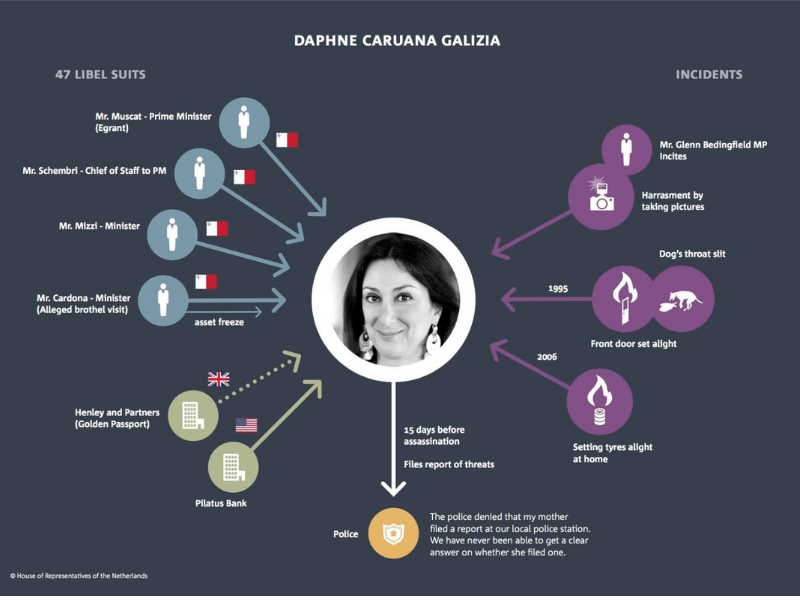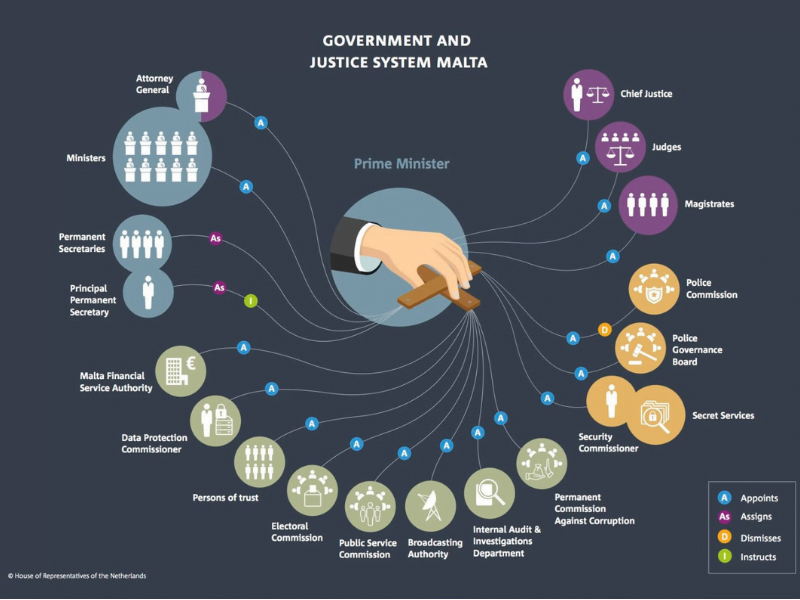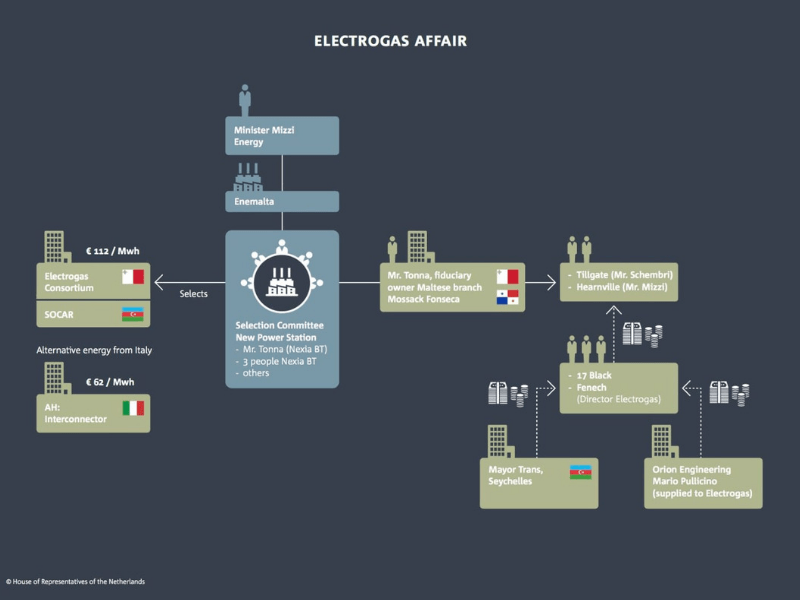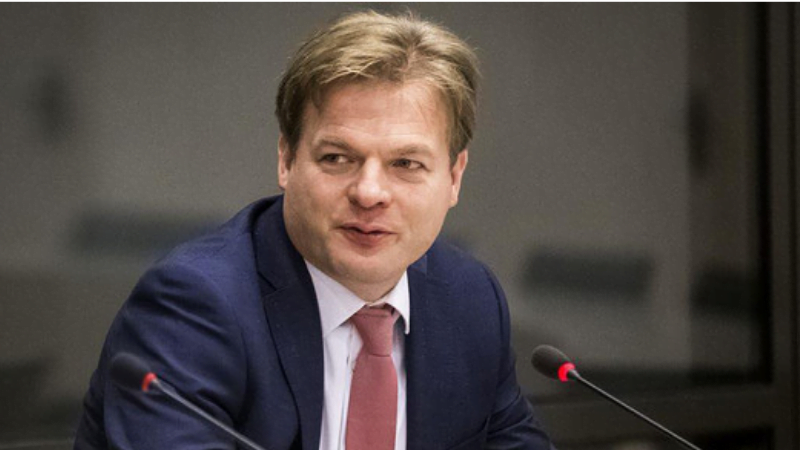The Committee on Legal Affairs and Human Rights within the Council of Europe today adopted the report by Special Rapporteur Pieter Omtzigt on Malta despite objections and amendment proposals by the Malta Head of Delegation and Labour MP Manuel Mallia.
The report entitled ‘Daphne Caruana Galizia’s assassination and the rule of law, in Malta and beyond: ensuring that the whole truth emerges’ was presented to the committee during a meeting in Paris this morning.
Omtzigt told The Shift News: “I am very glad that the committee adopted my draft report almost in its entirety, except for minor amendments”. He expressed “disappointment” at the lack of co-operation from the Maltese government, noting that Tourism Minister Konrad Mizzi and Economy Minister Chris Cardona had refused to meet him.
The Prime Minister’s Chief of Staff Keith Schembri, who together with Mizzi, was exposed in the Panama Papers leak, also refused to meet him. Schembri only accepted to join a meeting in which Prime Minister Joseph Muscat and Justice Minister Owen Bonnici were present.
Omtzigt’s report highlights no less than 10 concerns about the investigation into the murder of Daphne Caruana Galizia. It notes that the weaknesses of the rule of law and the criminal justice system are directly relevant to its analysis of the authorities’ response to the journalist’s brutal murder.

Infographic: House of Representatives, The Netherlands / Twitter
Malta is the first EU Member State to be subjected to the scrutiny of a Special Rapporteur.
Mallia, who had tried to have the Rapporteur’s mandate removed, also failed to make any progress today in attempting to stall the committee’s decision. The list of amendments he proposed was also rejected by the committee.
“The meeting took three hours because the committee addressed each of the concerns raised by Malta, one by one. And one by one, they were rejected,” Omtzigt told The Shift News.
The committee’s decision today was welcomed by a number of international press freedom and human rights watchdogs, including the European Federation of Journalists (EFJ), Transparency International, Reporters Without Borders (RSF), European Centre for Press and Media Freedom (ECPMF), as well as the United Nations Special Rapporteur Agnes Callamard.
The murder of #DaphneCaruanaGalizia is highlighted as one of the key scandals of the dysfunctional system. The Assembly identifies 10 serious concerns over the investigation into the murder.
— Agnes Callamard (@AgnesCallamard) May 29, 2019
Malta’s objections and amendments rejected
In a letter sent to Omtzigt as well as the Chair of the committee, Mallia requested a postponement of the decision taken today to adopt the report’s findings.
He raised “serious concerns” about the process followed by the Rapporteur in reaching his conclusions, saying he had not given enough time for a reaction from the government. He said the Rapporteur’s conclusions relied on “newspaper reports from undisclosed sources”.
Objecting to his recommendation of a public inquiry in three months, Mallia questioned how the Committee and wider Assembly could reach a conclusion as to whether the Magisterial investigation has or has not been appropriately pursued.
“The fact that you do not know that the investigation is being properly pursued is no basis for concluding that it is not,” Mallia said.
He objected to “the ultimatum” set, asking how such an inquiry could identify and bring the perpetrators to justice. “Why is this not an issue for the domestic courts under the rule of law?”
The Shift News asked Omtzigt about the specific timeframe set. “The research cannot wait because crucial evidence is lost over time. It is important to preserve crucial information. It is time to start. We were promised crucial evidence would be preserved and we expect it to be there”.
Mallia said he was unsatisfied: “the Draft Resolution and Report also contain a large number of adverse findings and conclusions that have never been put to the Maltese authorities for explanation or comment”.
He mentioned Omtzigt’s reference to Magistrate Anthony Vella’s promotion in the midst of his handling of ongoing inquiry on the journalist’s death and the Rapporteur’s observation that the three suspects facing charges had not been adequately interviewed.

Infographic: House of Representatives, The Netherlands / Twitter
Mallia also referred to Omtzigt’s noting that Konrad Mizzi and Keith Schembri had never been interviewed in relation to the case despite them being the subject of Caruana Galizia’s reporting. The Labour MP claimed he did not have “the information available to confirm whether or not these persons have been investigated”. But, he added, many others were the subject of her stories and that was no indication of the need to interrogate them.
He criticised the Special Rapporteur for “straying beyond the scope” of his remit in his letter, in which he also requested an investigation into the leak of the draft report ahead of the hearing. The list of amendments to the report he put forward was rejected.
The report’s main findings
The Council of Europe report cites “systemic failings” in the rule of law and democratic checks and balances in the country. It states that Malta’s government institutions, the criminal justice system and law enforcement bodies do not comply with European standards on the rule of law.
Significant weaknesses include a lack of independence on the part of the police and other authorities and excessive power in the hands of the Prime Minister. Worse, that concentration of power has been systematically abused and reinforced.
The Panama Papers and a number of other scandals including Vitals Global Healthcare, Pilatus Bank, Electrogas and Golden Passports affair have either not been investigated, or are the subject of investigations that are still ongoing years later.
When important investigations are ostensibly finalised (such as Egrant where the prime minister himself declared an investigation into himself to be a ‘closed chapter’) the actual reports are, instead of being published, being closely guarded by the government based on increasingly tenuous and ever-changing arguments.

Infographic: House of Representatives, The Netherlands / Twitter
Omtzigt points out that these are “established, uncontested facts, not just speculation or allegations”.
Concerns were also raised around the investigation into the murder of Daphne Caruana Galizia. The current state of the murder investigation is described as suffering from a “prevailing culture of impunity”. Maltese authorities are called upon to robustly investigate and prosecute those suspected of being involved in the scandals Caruana Galizia exposed, as well as those who carried out the murder and masterminded it.
He gives his full support for the clear need for an independent inquiry to start within the next three months, pointing out that failure of the Maltese government to do so will be a breach of Article 2 of the European Convention on Human Rights (ECHR).
Shortcomings with the government’s recent Whistleblowers Act were also mentioned in the report. The Council of Europe report notes that, while this legislation is indeed “laudable” on paper, it is being ignored or undermined in practice by each of the government and the Attorney General.
The government has made many public statements praising the judicial reforms they are undertaking, but the Council of Europe is not convinced, noting that “the proposals fall short of the Venice Commission’s recommendations in several important aspects”.
The Council of Europe calls on Malta to implement the Venice Commission recommendations in their entirety, adding that the Prime Minister’s recent judicial appointments show “contempt for the courts”, an attitude entirely at odds with Muscat’s promises to implement the recommendations.
“Despite certain recent steps, Malta still needs fundamental, holistic reform, including subjecting the office of Prime Minister to effective checks and balances, ensuring judicial independence and strengthening law enforcement and other rule of law bodies”.
The report further warns that “Malta’s weaknesses are a source of vulnerability for all of Europe”, and that if “Malta cannot or will not correct its weaknesses, European institutions must intervene.”
The next step
The Council of Europe, based in Strasbourg, is primarily a human rights organisation. It is an entirely separate organisation from the European Union (EU), but all 28 EU Member States are members of it.
The Council of Europe advocates freedom of expression and of the media, freedom of assembly, equality, and the protection of minorities. The Council of Europe helps member states fight corruption and terrorism and undertake necessary judicial reforms.
Its group of constitutional experts, known as the Venice Commission, offers legal advice to countries throughout the world. Its best-known products are the European Convention on Human Rights – a treaty designed to protect human rights, democracy and the rule of law – and the European Court of Human Rights that oversees how the Convention is implemented.
The next step to follow today’s endorsement of the Special Rapporteur’s report by the Committee on Legal Affairs and Human Right is the report’s consideration and final adoption by the Parliamentary Assembly, scheduled for June.













